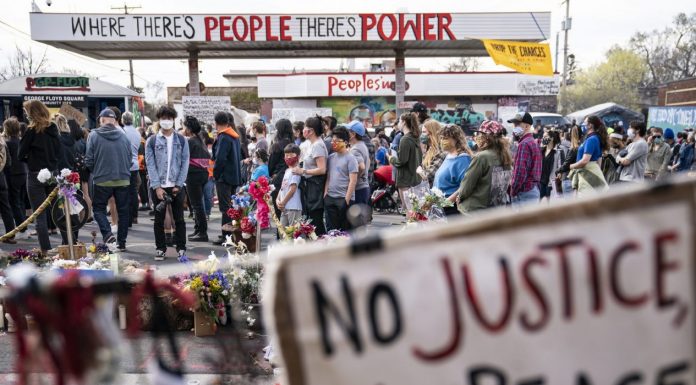(Headline USA) Following in the footsteps of his former boss, Barack Obama, President Joe Biden is considering whether to step into the debate pending a verdict in the trial of former Minneapolis Police Officer Derek Chauvin.
As it did during the Obama administration, such a move would be sure to inflame and exacerbate existing tensions, with race riots once again threatening to boil over into widespread violence, vandalism and looting.
But unlike the smooth-talking Obama, the gaffe-prone Biden—who himself has a history of making racially offensive remarks—offers little upside with his involvement in the political time-bomb.
Closing arguments began Monday in Chauvin’s trial with a prosecutor telling jurors that the officer “had to know” he was squeezing the life out of George Floyd as he cried over and over that he couldn’t breathe and finally fell silent.
Chauvin faces murder and manslaughter charges.
Already, involvement from radical, race-baiting Rep. Maxine Waters, D-Calif., helped to incite an attack on Minneapolis police over the weekend and provided Republican critics an opening to note the Left’s problematic hypocrisy on riots and police violence.
Waters’ efforts to influence the verdict also prompted the judge overseeing the Chauvin trial to warn of a potential mistrial if political rhetoric interfered with the judicial process.
Nonetheless, the White House is privately considering whether Biden should address the nation and dispatch specially trained community facilitators from the Justice Department, aides and officials told The Associated Press.
It eerily echoed former Attorney General Eric Holder‘s decision to get involved with the trial surrounding Ferguson, Missouri, shooting victim Michael Brown.
Holder’s presence raised the expectation of a guilty verdict, which further outraged social-justice rioters when the police officer responsible for the shooting was acquitted.
That led to a second wave of rioting and personal embarrassment for Holder, who resigned shortly thereafter.
The plans for possible presidential remarks are still fluid, with the timing, venue and nature of the remarks still being considered, in part depending on the timing of the verdict, according to two White House aides who were not authorized to speak publicly about private conversations and spoke to the AP on condition of anonymity.
The White House has been warily watching the trial proceed in Minneapolis—and then another shooting of a black man by a white police officer last week—and are preparing for the possibility of unrest if a guilty verdict is not reached in the trial.
Biden may also speak after a guilty verdict, the White House aides said.
Press secretary Jen Psaki said Monday that the White House has had a “range of conversations” about preparations for the upcoming verdict and added, “Our objective is to ensure there is space for peaceful protest.”
“Of course we’ll let the jury deliberate and we’ll wait for the verdict to come out before we say more about our engagements,” Psaki said.
Psaki said administration officials have been in contact with leaders in Minnesota and in other cities and states that saw unrest after Floyd’s death last year.
She declined to answer if Biden would be “disappointed” if a not guilty verdict was reached. She said that Americans could expect to hear from the president soon after the verdict, no matter what it is.
Meanwhile, the FBI and the U.S. attorney’s office in Minnesota have been working with local officials to support law enforcement as they prepare for the possibility of unrest after the verdict, officials said.
And the Justice Department has also dispatched specially trained community facilitators ahead of a verdict, according to a senior Justice Department official. The official could not discuss the plans publicly and spoke to the AP on condition of anonymity.
The officials, part of the Justice Department’s Community Relations Service, tout themselves as “America’s Peacemaker” by mediating disputes in communities and holding listening sessions to help prevent future conflicts.
A federal civil rights investigation, separate from the trial, remains ongoing. Several witnesses were subpoenaed earlier this year to appear before a federal grand jury considering charges against Chauvin.
The Justice Department’s civil rights investigation has been focused on Chauvin and some of the witnesses, including other officers who worked with Chauvin, people familiar with the matter have told the AP.
Chauvin was prepared to plead guilty to third-degree murder in George Floyd’s death before then-Attorney General William Barr personally blocked the plea deal last year.
Barr rejected the deal in part because he felt it was too soon, as the investigation into Floyd’s death was still in its relative infancy, law enforcement officials said.
Across the country, police departments are also preparing for the possibility of rioting or other unrest, with some canceling vacation time and increasing the number of officers available for shifts. The federal government hasn’t detailed its plan in the event of widespread or sustained civil unrest.
Pentagon spokesman John Kirby said Monday that there has been a request from officials in Washington, D.C., for D.C. National Guard forces in the event there is civil unrest in the nation’s capital, and it is currently being reviewed by the Army.
He said the Army secretary has the authority to approve any request for D.C. National Guard but did not have details on the request.
Adapted from reporting by the Associated Press

